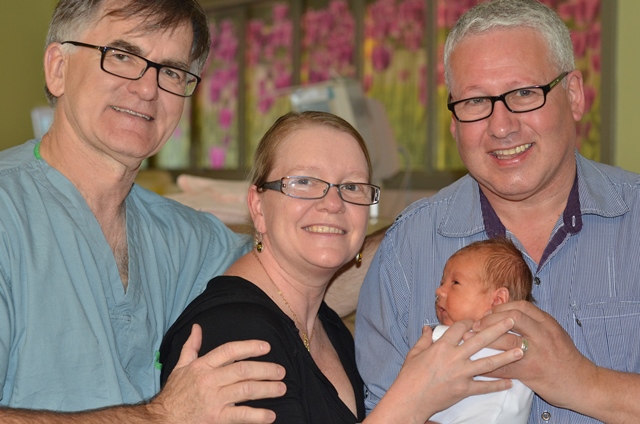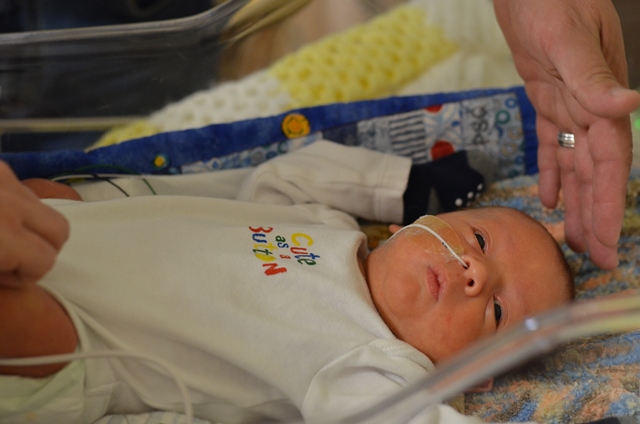
New parents Susanne Hingley and Mark Alford are caught in a moment of calm, curled up in a corner of Royal Columbian Hospital’s neonatal intensive care unit cuddling their only son in their arms.
All around them, the unit is bustling: doctors doing rounds, nurses bathing babies and mothers nursing mewling newborns. But the couple barely register the activity: they are focused solely on their firstborn’s face, gazing down with tears welling in their eyes. He’s their miracle baby, in more ways than one.
“I tear up especially these days as I have new life in my hands,” Mark says as he cradles his son in a yellow and white knit blanket. “If it wasn’t for Royal Columbian back then, I wouldn’t be here to hold Huxley.”
Almost 40 years ago, Mark’s life was also in the hands of the Fraser Health region hospital’s physicians and nurses. He was studying at BCIT in Burnaby, B.C. when he collapsed of a brain aneurysm and was rushed to the hospital. For five weeks he lay in a medically-induced coma. But he survived, left only with some cognitive and physical deficits that subsequent surgeries and many months of rehabilitation helped address.
Mark had dreamed of having a family, but he didn’t meet Susanne until he was in his 50s. The couple married five years ago and immediately started planning for children. With fertility support, Susanne, now in her late 40s, got pregnant with their son. It was a textbook pregnancy, until at 27 weeks her cervix showed signs of giving out. This time, she was the one rushed to Royal Columbian, flown in from their home in Whitehorse to the New Westminster B.C. hospital to spend the next month on bed rest to delay the birth of their boy.

But he wouldn’t wait. In early March, Susanne showed signs of delivery. Huxley was born by caesarean section on March 5, at 31 weeks gestation, weighing 4.4 pounds. His tiny foot, which had pushed through her cervix, was purple for a week. Otherwise, he was perfect.
“He was tiny and fragile, for us. You were scared you were going to break him,” Susanne recalls. “Holding him for the first time, I think I cried the whole time. I’ve often heard people say, ‘My heart broke wide open.’ And it does.”
The couple are just one of the grateful parents of babies cared for by staff in Royal Columbian Hospital’s NICU. And their incredible story is one of many. On this day, there are 15 other babies being cared for in the unit, but each year staff work similar miracles with more than 500 infants in their care.
Their hard work was recently recognized on a national level. Royal Columbian Hospital was again ranked one of the top hospitals in the country in caring for infants in its NICU in the latest Canadian Neonatal Network report.
The hospital’s NICU, which cared for 528 of B.C.’s premature and vulnerable infants during the study period, was rated one of the best in the country at saving these high-risk babies. It achieved a 98.6 per cent survival rate overall for its infant patients, this despite the fact that as a Level 3 NICU it also cares for some of B.C.’s “micro preemies”: babies as young as 25 weeks’ gestational age who weigh less than a pound and are just on the cusp of viability.
“This is an extraordinary, national level team performance,” said Royal Columbian neonatologist Dr. Zenon Cieslak. “We have a great team here. There are many reasons we’ve done well, but the commitment and compassion of the people who work in the hospital is a big one. We have a real team united with the same goal of helping these families and babies.”
The study compared infant outcomes across 31 NICUs in Canadian hospitals. It examined the outcomes of more than 15,000 babies treated in Level 3 NICUs such as Royal Columbian’s. Dr. Cieslak said the hospital’s NICU has been consistently near the top of the rankings over the roughly18 years that the Network has been producing the study.
Huxley’s parents have experienced this top-tier care first hand.
“Every single doctor and nurse was talking us through,” Susanne says of the help they received during the overwhelming first days of her preemie son’s birth. “There was always assistance, there was reassurance. It was very encouraging and it helped to keep you going. It allowed you to relax in a stressful situation.”
With the help of their team of doctors and nurses, including Dr. Cieslak, Huxley has steadily improved. At 36 weeks he’s up over seven pounds and he no longer requires help breathing or treatments for jaundice, although he remains on a feeding tube. The couple hope to take him home soon.
“At night, when I go home, I have no worries,” Mark says, expressing complete faith in the hospital that helped make his family possible. “You guys gave me new life, twice.”

